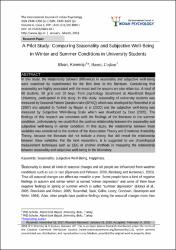A Pilot Study: Comparing Seasonality and Subjective Well-Being in Winter and Summer Conditions in University Students

View/
Access
info:eu-repo/semantics/openAccessDate
2018-02-18Access
info:eu-repo/semantics/openAccessMetadata
Show full item recordAbstract
In this study, the relationship between differences in seasonality and subjective well-being were examined by experimental for the first time in the literature. Considering that seasonality are highly associated with the mood and the seasons are also relate too. A total of 68 students, 58 girls and 10 boys, from psychology department at AbantIzzet Baysal University, participated in this study. In this study, seasonality of university students was measured by Seasonal Pattern Questionnaire (SPAQ) which was developed by Rosenthal et al (1987) and adapted to Turkish by Noyan et al (2000) and the subjective well-being was measured by Subjective Well-Being Scale which was developed by Dost (2005). The findings of this research are consistent with the findings of the literature in the summer condition. Unfortunately, we could find the positive relationship between the seasonality and subjective well-being in winter condition. In this study, the relationship between these variables was considered in the context of the Association Theory and Emotional Instability Theory, because the literature did not include a theory that did reveal the relationship between these variables. For the next researchers, it is suggested to use physiological measurement techniques such as EEG or another methods in measuring the relationship between seasonality and subjective well-being in the laboratory.

















